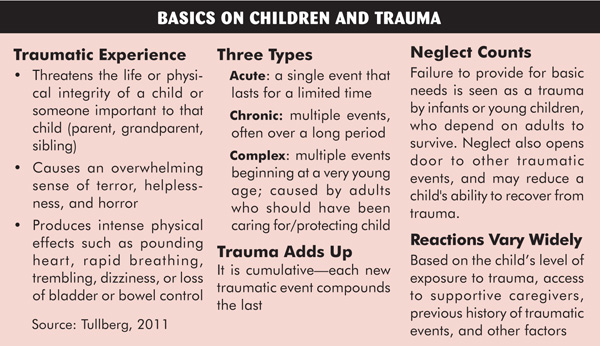Recent research has given us a richer understanding of just how maltreatment and other traumas hurt children. As Tullberg (2011) summarizes, studies have revealed trauma can negatively affect children’s:
- Brain development
- Sense of personal safety
- Ability to trust others
- Sense of the future
- Behavior and social relationships
- Ability to navigate life changes, and
- Learning and school performance.
Trauma’s footprint can be huge. Success or failure in these domains profoundly affects the trajectories of children’s lives.
Children are also affected when parents are traumatized. Tullberg cites a study of child welfare-involved mothers in New York in which 92% had experienced at least one type of traumatic event (e.g., domestic violence); 35% of these mothers thought trauma symptoms affected their parenting or their relationship with their child. Trauma stress reactions—symptoms can include difficulty concentrating, detachment, anger, and others—can make it hard for parents to engage with the child welfare system.
If we want to be effective as child welfare professionals and make a lasting difference to families and children, we must ensure our work is guided by what we know about trauma and how to respond to it.
We’d like to support you and your agency as you seek to learn about and engage in trauma-informed child welfare practice. Therefore this issue includes information about how trauma affects the developing brain, identifies trauma-informed concepts and practices that are already part of child welfare policy in North Carolina, describes the way trauma affects our work with birth parents, and offers concrete steps you can take to make your work with families more trauma-informed and therefore more effective.

Contents of this Issue